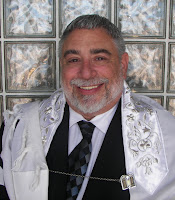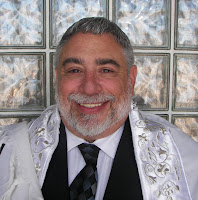These are a Few of My Favorite Things
Golf on an early morning, just early enough to smell the newly mowed fairways, but late enough that the dew has evaporated; the smell of a ballpark during batting practice, before all the fans get there; the sound of the crack of each ball being whacked toward the outfield, the sound of its speed and the thump it makes against a lone wall in an empty stadium.
Parshiot (The weekly Torah Portions of) Bereishit, Noach, VaYetzeh, Yitro, Bo and others; Chanting Haftarot; a child being called to the Torah for the first time; a baby’s first wail. Watching the sun rise against the Kotel, and set over the Mediterranean, while sitting on the Tayelet at Gordon Beach in Tel Aviv. The sound of Shofar; the mumbling of silent davening, each one of us at our own tempo, rhythm, pace, and melodies.
Most of all, though, I think that my favorite thing to see and to hear, is watching the faces of my students when we take the Sefer Torah out of the Ark; and seeing their excitement when they come to Kabbalat Shabbat on Friday afternoon.
Today, Yom Kippur, is a day to reflect on all of these, and more. A day to sit back and listen to the Chazzanut, to the sounds of prayer and to introspectively remember, atone, accept and forgive.
A well known scholar in Tel Aviv, who goes by the pen name of IsraelSeen recently referred to Yom Kippur as such. He said: Yom Kippur means the “day of atonement, or rather the day of At-One-Ment. It is a day that culminates the inner-work that we Jews are asked to do especially intensively since Rosh HaShana, the “New Year” according to the Jewish calendar that is marked by the Moon cycles with some adjustment so it coincides closely with the solar calendar."
Actually, to be more precise it is from Tisha B’Av, the day when we fast and remember the destructions of the Temple past and all of the other tragedies that have befallen on us as a nation. It is from this moment that we search for the part of us that inspires forgiveness and substitutes the darkness within our souls, for the light that we are and have always been in spite of the forgetfulness of daily life.
As Einstein once said, darkness does not come from G-d but from an absence of light. For this, my friends is the world that we inherited, in much better shape than we find it now, and it is this world that we are asked by G-d to repair.
The Desiderata, a late 1700’s poem written by an unknown poet speaks to us even two hundred and thirty years later reminding us to be gentle with yourself. You are a child of the universe, no less than the trees & the stars; you have a right to be here. And whether or not it is clear to you, no doubt the universe is unfolding as it should. Therefore be at peace with G-d, whatever you conceive Him to be, and whatever your labors & aspirations, in the noisy confusion of life keep peace with your soul. With all its sham, drudgery & broken dreams, it is still a beautiful world.
It is on us, Chaverai to remember these things today, and to act on them tomorrow. To ask G-d for forgiveness today, and begin living a better life, tomorrow; to say Modeh Ani Lefaneicha when we arise each day and to truly thank G-d for our presence, each and every day. To make the best use of our time, to strive for happiness through Torah, through Avodah, service to haShem, and through G’milut Chasadim, the random acts of loving kindness that we all have within us to perform.
It today’s Torah portion we just read that after his sons Nadav and Avihu had died as punishment for their improper service, Aharon was told to enter the Holy of the Holies only on Yom Kippur, at which time atonement was to be made for the sins of the community (including the Priesthood) and the Sanctuary was cleansed because it might have been entered by those who were ritually unclean. On Yom Kippur, the Kohein Godol (High Priest), dressed in white garments rather than gold ones, offered all the sacrifices.
The ritual included the casting of incense upon coal taken from the Altar, and the sacrificing of one of two male goats provided by the people for their offering. The commandment was given to us to observe Yom Kippur as a most solemn Shabbat (the Shabbat of Shabbatot), to fast and to repent for our misdeeds.
We read about the laws forbidding the eating of meat of an animal which wasn't ritually slaughtered and the forbidden intake of blood; and we read about High Moral Conduct. We continue to be reminded that Hashem expects of us a high level of moral conduct; thus, adultery and illicit marriages were prohibited, with the Torah citing examples of nations destroyed for immoral behavior.
This afternoon, during Mincha, we will learn again the Story of Jonah and what was asked of him by G-d. We will remember that we may be able to run from ourselves and our actions, but that we cannot hide from G-d. This, my friends, is not, in my opinion, meant to be a threat by G-d, nor do I believe that it is a warning, per se. I believe this to be a reminder to us that G-d is everywhere. He is above us and below us; to our right and to our left; in front of us and behind us. In every sense. G-d is with us on High and in our lowest moments; His angels sit upon our shoulders and watch over us.
Today, we promise G-d that from now, we will be the Best that We Can Be. We will strive for high moral ground, and we will love our neighbors as ourselves; We will cease from all forms of Lashon haRa, and help to make this World a better place; We will look to G- d for strength, while continuing to praise His holy name. We will love Him b’chol levaveinu, with all our hearts, u’bchol Nafsheinu, with all of our souls, u’bchol Moadeinu, and with all of our strength. We will take these words to heart and teach them diligently to our children. For as by design, our children are our future.
Yehi Ratzon Milfaneicha, haShem Elokeinu, v’Elokei Avoteinu, Sheh Tichadesh Aleinu Shana Tovah u’Metukah; G’Mar Chatima Tovah; u’Chol masheh tov b’Maaseinu. May it be your Will, O’ G-d, and G-d of our ancestors, that you will bless us with a good and a sweet year; that we will be inscribed into your Book of Life for yet another year; and that you will bring us the peace and solace for all things good this coming year.
---------------------
During Mincha, the afternoon service, my first born seventeen year old twin son joined me on the Bima. His helping me to lead our congregation was not planned. Zac is an above average Hebrew reader, but not fluent; he has a very nice singing voice, but not that of a performer in musical theatre, or in the Chazzanut, but this day was different. Very different.
When Zac joined me on the Bima, his reading, pronounciation, inflections and Chazzanut were not only perfect, but as we proceeded with Mincha, the afternoon service and into Neila, the closing service of Yom Kippur, our voices became as one. When I paused, he paused. When I started, he started. When my nusachim (melodies) changed, so did his. We were literally one voice. One voice so directly connected to G-d that by the end of the service, and blowing of the Shofar signaling the end of the holiday and the end of the fast, we were both in tears. Tears of happiness as well as pride and elation. Bar none, this Yom Kippur was the singlemost incredibly spiritual experience of my Rabbinical Career, if not my life.
As we move now to Sukkot, our "Season of Joy", we are within a week of celebrating our finishing to read the Torah, and a new beginning to the old, but very much alive book. Next Saturday night, we will finish reading the book of Devarim (Deuteronomy), and begin Genesis from, well, the beginning. It is this continual reading, telling and studying that keeps Torah alive in all of us. Jews and non-Jews alike. A friend said to me just last night that the same G-d that lives in me, lives in him. He is Catholic. Isn't it nice to have friends who share this belief?
Shorts
Word came from Israel this morning that a video was made on September 14, just two weeks ago, in which Gilad Shalit speaks to the world, PM Netanyahu and his parents. Gilad appears in good health and albeit, maybe tired and thin, he does appear to be healthy. This video, in Hebrew, may be found by clicking on this link:
http://www.youtube.com/watch?v=bqiT_xvUM2Y&feature=player_embedded.
A wonderful organization by the name of 6M for 6M is raising $6,000,000 to make a film called An Unbroken Chain based on a book by the same name by Dr. Henry Oertelt. Through his lectures and book, Oertelt’s story has been used in middle schools, high schools and colleges to educate students on the Holocaust and hate issues for over 40 years. To find out more please visit
http://6mfor6m.org/.
Congregation Kehillat Emek haMidbar continues to seek a home in North Phoenix/Scottsdale. Should you come across anyone in the area that works in commercial real estate, leases, property management that might like to help a brand new Synagogue, please write to:
emek@q.com.
------------------------------
From the Emek (Valley) in the Midbar (Desert), I wish you a very restful Shabbat Shalom, and Chag Sameach. May you enjoy your Sukkot holiday with an abundance of happiness.
B'ahava u'Vrachot...
With love and blessings for a restful Shabbat Shalom and a wonderful Sukkot, filled with an abundance of happiness, I wish for you all that you wish for yourself, and G-d's blessing.
--Rabbi Alan Abrams




